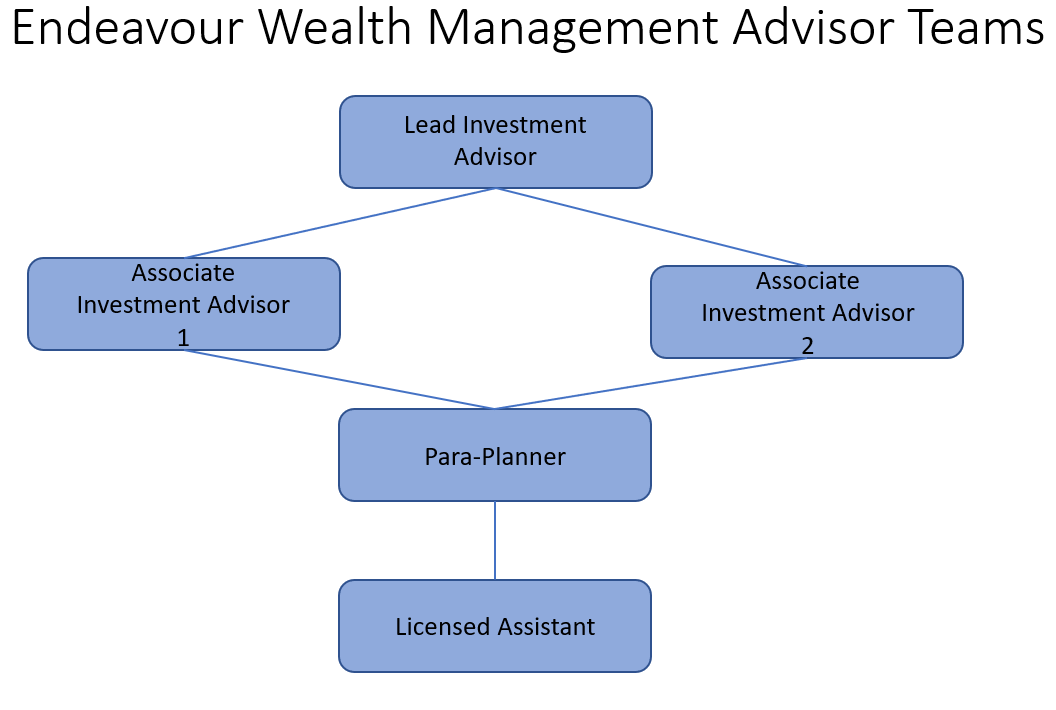The Whiteboard: portfolio manager on why some advisors struggle to build a strong team and the model that’s worked for him


Grant White is a Portfolio Manager/Investment Advisor at Endeavour Wealth Management with Industrial Alliance Securities Inc, an award-winning office as recognized by the Carson Group. Together with his partners he provides comprehensive wealth management planning for business owners, professionals and individual families. In this edition of “The Whiteboard”, a twice monthly column with WP, he looks at why some advisors struggle to build a strong team and the model that has worked for his own firm.
For those of you who don’t know me, I grew up in the financial services business. My father started as a life insurance agent back in the 80s and later became a financial planner. As a kid, I got a taste for the business and had a real admiration for the work my father was doing and the impact he was able to have on his client’s lives. This ultimately inspired me to join the industry.
The industry has changed a lot since I was a kid and one of the first things I recognized was that in order to deliver the level of service and client experience I wanted, I couldn’t do it alone. I needed to be different in my approach and build a team. Today, that trend has continued, and in my opinion, if you are looking to ensure that your clients’ needs continue to be served in the best manner possible, having a proper strategy in place for building a team will be necessary.
Unfortunately, this is an area in which I see advisors struggle with the idea of building strong teams that last. I have seen a few common trends in this area.
- Lack of mentorship and guidance
Too many advisors hire young, fresh out of university grads, and expect them to come in, light the world on fire and bring in business. I have seen this time and time again, and the only thing it has been truly successful at doing is driving good young talent into other industries. Before hiring someone, make sure you have a plan in place, expect to spend time with that individual one-on-one weekly and even daily to provide them the guidance they need. Also, set a career path for them and show them what it takes to reach the next level.
- Giving up the spotlight
Given the nature of our business, many of us who have been successful in the business are often comfortable not only being in the spotlight, but also owning it! The challenge is that in order to build a successful team you need to be willing to share some of it. Admittedly, this was, and is, something that I struggle with but when you have a grand vision for what you want to do, it does make it easier. Additionally, I would consider giving up some of your ownership in the business if you are looking at building a team that will stand the test of time. Most of us want to feel like we are a part of something bigger than ourselves and ownership can go a long way in supporting that. Don’t get caught playing too short a game but also make sure you’re not giving equity up for free as well.
- Pay people what they are worth
When you find good people, compensate them well. We all know this but so many of us still fail to recognize that it costs more to find and train new people than it does to retain them. In saying that, be aware of what the going rate is in the market. If you are paying $80,000 for someone when the market rate is $40,000, you may have a problem, or at the very least you know that the person you have needs to provide an additional $40,000 of value to your business annually above the rest.
So, what should you be looking for in a teammate? At Endeavour Wealth Management we have a defined set of characteristics we look for in people, which we feel is part of the reason we are different. At the top of that list is their individual set of values and “coachability” factor. In my opinion, these are things that you cannot teach and are the prerequisite for working with us. You should develop your own list of qualities which are important to you and the development of your business. Depending on their level of experience in the industry, we start new team members in the appropriate role and structure our teams as follows:
Note: This is the model for a $1 million+ revenue team
As a Lead Investment Advisor your role is to act as the “CEO” of your team and develop the strategic plan going forward. Your main role is setting the models, helping to bring in new accounts (especially the bigger accounts) and mentoring your team members so they can achieve the potential of their role.
Associate Investment Advisors are salaried advisors who handle a large portion of day-to-day client servicing and will even conduct client review meetings for certain segments of clients. Our Para-planner role is our entry position for recent grads who are looking to become advisors. Our focus with them is to teach them how to be successful advisors and instill proper processes and best practices to ensure they will be successful. We have found this approach to be far more successful than the traditional sink-or-swim model. Last but absolutely not least, our Licensed Assistants handle the day-to-day operations and administration of the team, ensuring that we are maximizing revenue per hour for each of the other roles.
The key to all of this and teaming success is having clearly defined roles and processes. Without them your team may be doomed to fail and ultimately leave you frustrated. If done properly, you can build the right team which will not only enhance your service offering and your revenue but also afford you the opportunity to achieve mastery over the rest of your life as well. Of course, there is a lot more that goes into building a team than I can fit into 1,000 words, so please feel free to leave comments and questions.
This information has been prepared by Grant White who is a Portfolio Manager/Investment Advisor for Industrial Alliance Securities Inc. Opinions expressed in this article are those of the Portfolio Manager/Investment Advisor only and do not necessarily reflect those of Industrial Alliance Securities Inc. Industrial Alliance Securities Inc. is a member of the Canadian Investor Protection Fund and the Investment Industry Regulatory Organization of Canada.




